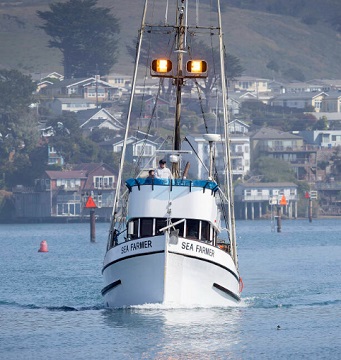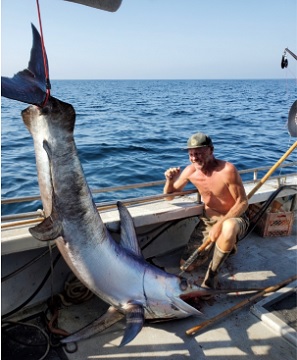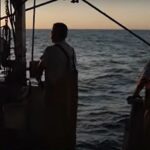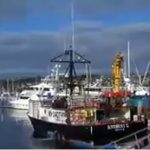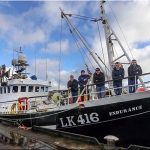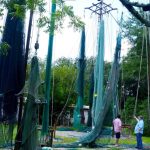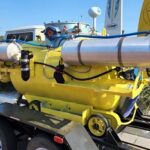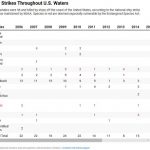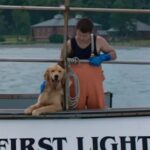Tag Archives: California
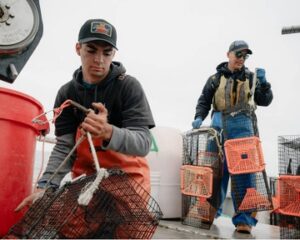
California’s Salmon Fishers Are Facing a Summer Without Salmon. Will They Get Federal Help?
On another day, Matt Juanes would have set out on the water long before sunrise. Juanes, an experienced salmon and crab fisherman who has worked out of Fisherman’s Wharf for over five years, is no stranger to the trade. Today, though, he would be chasing an unfamiliar catch for the first time: coonstripe shrimp. Juanes is one of hundreds of commercial fishers who dock along the Golden State coast and who would normally be out hunting mighty chinook or “king” salmon — the mainstay of California’s commercial salmon fishing industry. The first months of summer are typically a premier time for both salmon and salmon fishers. But this summer, California’s salmon fishing season is completely shut down for the first time in over a decade. Photos, >click to read< 09:40
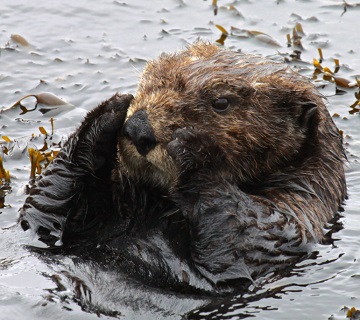
(Un)welcoming Waters: Sea otters poised for comeback to Marin and Sonoma counties
On a daily basis, sea otters consume 25% of their body weight in food. Hence, there are very real concerns by the fishermen who make their living hauling in Dungeness crabs and the other invertebrates that sea otters devour. Reestablishing sea otters could disrupt an entire industry right here in Marin and Sonoma counties and beyond. Dick Ogg, a Sonoma County resident for 62 years, has been fishing most of his life. For the last 25 years, he’s been a commercial fisherman, with his income relying heavily on crabbing. “They’re cute, the sea otters, but they are going to eat whatever they can get their hands on. Everybody knows bringing them back is going to affect the crab industry.” >click to read< 10:24
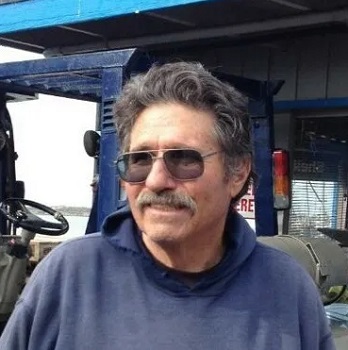
Commercial Fisherman Frederick Reno Italo Arnoldi of Morro Bay, has passed away
Frederick “Fred” Arnoldi, 72, of Morro Bay, California, left on his Eternal Hunting and Fishing Trip in the early morning hours of Tuesday, June 27, 2023. He is survived by his wife Diane Arnoldi; siblings Dennis Arnoldi and Janice Morgan; nieces, nephews, children, grandchildren, and great grandchildren. Fred was born and raised in Santa Barbara, where he attended Santa Barbara High School. He left Santa Barbara to become a commercial fisherman from 1968 until his last day on earth. He fished salmon in Alaska and the South Seas. Fred seined in San Pedro, and fished herring in San Francisco. Fred owned several vessels including Drifter, Halcyon, Roselena Marie, H2O K-9 and Amakua. >click to read< 21:29
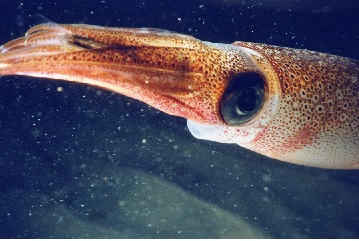
Cooler ocean means better business for squid fishermen off La Jolla
Though a cool and wet start to 2023 had many locals lamenting the weather, coastal fishermen and seafood lovers are celebrating an environmental perk: the proliferation of squid off La Jolla’s coast. “It’s a historical thing that happens,” said independent commercial fisherman John Law. He said the squid currently are abundant from the underwater canyons off Scripps Pier down to Crystal Pier in Pacific Beach and even into Baja California, Mexico. Catching squid is a “team effort,” said San Diego fisherman Kelly Fukushima. The squid feed at night, so catching them requires two boats: one to scout the squid and use lights to aggregate a school and a second to catch and haul in the squid. >click to read< 14:01
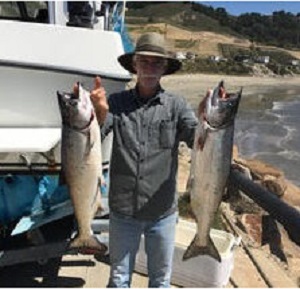
Will Morro Bay wind farms be the demise of Port San Luis?
I heard about the proposed Morro Bay Offshore Wind Farm awhile back but didn’t really think too much about it. But now I understand there is a plan to industrialize Port San Luis to be used as a base to assemble, operate, and maintain the 1,000 feet wind turbines for the wind farm and for the Vandenberg Space Force base to barge in rockets and components that are too large to travel by land. I am not sure this is such a good idea. I began to do some research on wind farms. This developed into hours and hours of digging through material. What I have learned is quite alarming. >click to read< 08:06
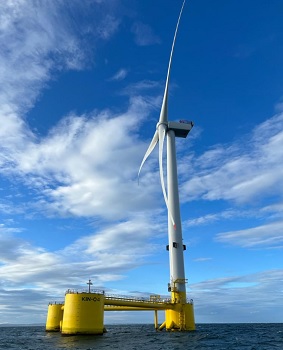
Who will benefit from Morro Bay wind energy job creation?
California plans to rely on offshore wind energy to achieve its renewable energy goals. The off-shore wind farms are projected to generate 2,000 to 5,000 megawatts of energy by 2030 and 25,000 megawatts by 2045. Cyrus Ramezani and Mahdi Rastad’s 86-page report details the economic impacts of the Morro Bay wind energy projects and identifies the types of jobs that will be created. Last year, the federal government auctioned off three offshore wind energy sites located between 20 and 30 miles off the coast near Morro Bay. The report does not discuss the number of jobs the county will lose in the fishing and hospitality industries. >click to read< 16:30
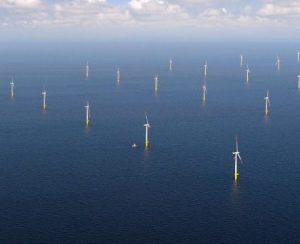
California: Can wind energy and fishing industry co-exist on the coast?
A statehouse hearing on offshore wind energy explored “The Future of Fisheries and Offshore Wind Energy in the Golden State” and fishing representatives said the scenario is unknown and they’re concerned. Fishermen are bracing for impacts to their livelihoods, as leases for five areas off the California coast, including two in Humboldt making up about half of $775 million plus in lease sales, have been federally-approved. Unavoidable impacts to fishing are expected so compensation for consequences like loss of fishing grounds will eventually be calculated. But fishing representatives said at this point the scale of the impacts can only be guessed and the leasing process hasn’t been inclusive enough. >click to read< 11:12
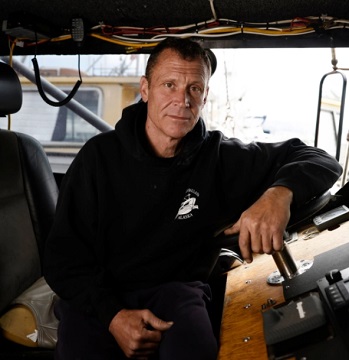
Dungeness crab fisherman from Half Moon Bay claims hefty fine ‘the most unfair thing’
Half Moon Bay commercial fisherman Paul Toste this week agreed to pay $17,000 in fines after state game wardens caught him fishing illegally for crabs in a marine preserve. But Toste, 52, claims he was unjustly persecuted and punished for a simple navigation mistake. “This was the most unfair thing I’ve ever seen in my life,” Toste said. “The original fine was $610,000 — for 15 crab pots. They tortured me for nine months of negotiating. It was one of the most horrible things I went through.” When he moved to the area 16 years ago, fishing was legal in what is now the reserve, he said. “They took that away from us,” he said. “We never were compensated for it, and then … I’m receiving a ticket for $610,000.” >click to read< 14:35
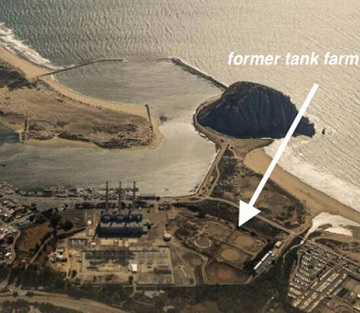
Morro Bay group plans initiative to block proposed battery storage plant
A group of Morro Bay residents who call themselves Citizens for Estero Bay Preservation has submitted a citizen’s initiative that aims to block construction of a battery storage facility near the old power plant. The 24-acre site for the proposed battery plant is adjacent to a major PG&E substation, where it would connect to the California grid via high-voltage power lines that climb the hills from Morro Bay across SLO County to the California transmission system. Some critics, however, don’t want to see these systems in their backyard. They point to the need to preserve Morro Bay’s fishing village atmosphere. There is another aspect to all this. Many of the same critics don’t want the offshore wind project either and lump their concerns together. >click to read< 08:52
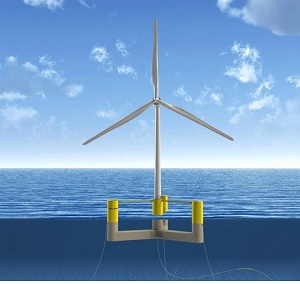
Old lumber port preps for new life as California offshore wind hub
Eureka’s halcyon days as the “timber capital” of California are long gone, but the deepwater port city 270 miles north of San Francisco may see its fortunes turn as the hub of the state’s first foray in offshore wind energy. Eureka sits across two of the five swaths of Pacific Ocean along the California coast that the federal government auctioned off to offshore wind developers this past December for a total of $757 million. The three other leases are on the Central Coast across from Morro Bay. Humboldt Bay, the second-largest bay in California after the San Francisco Bay, is ideally suited to become the final assembly port for the massive turbines. >click to read< 15:43
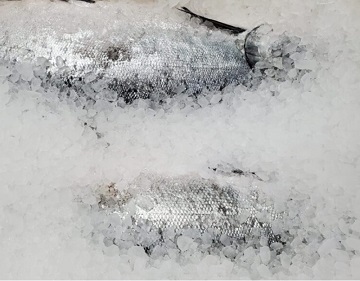
Alaska trollers will feel pain and unnecessary hardship from ruling on orca lawsuit
As president of Seafood Producers Cooperative, representing nearly 400 fishermen-owners, who reside in California, Oregon, Washington and Alaska, I want to convey our great disappointment and frustration with the recent ruling concerning the Wild Fish Conservancy and their lawsuit directed at our Salmon Troll fleet. The WFC found a technicality in National Oceanic and Atmospheric Administration’s biological opinion for troll-caught king salmon. No other fishing gear groups are being attacked and other commercial and sports fishermen in the region – and in the Puget Sound – will continue to harvest king salmon. >click to read< 08:59
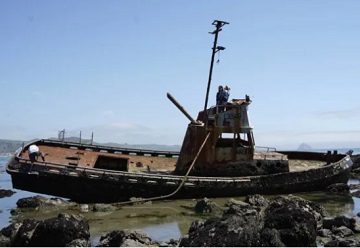
Shipwrecked ‘ghost boat’ looms on SLO County coast. Where did it come from?
Rumors circulate about how the so-called “ghost boat” came to rest off the coast of Estero Bluffs, with some claiming that its owner fell asleep at the helm while returning home from a fishing trip. According to a U.S. Coast Guard incident report, boat owner Jonathan Smith was fishing on July 28, 2017, when his boat drifted too close to the Estero Bay shore. Smith’s deckhand wasn’t feeling well and “went below deck to rest” — leaving Smith to fend for himself, the incident report said. At about 3:45 a.m., the boat’s propeller caught on a crab pot line, so Smith stopped the engine to try to untangle the line, the report said. photos, >click to read< 08:15
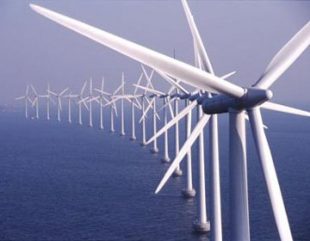
Wind-power auction at Morro Bay shows how money matters in climate projects
This head-scratching story is centered on Morro Bay. When offshore wind development became a public issue there nearly a decade ago, citizens expressed concerns about the impacts of turbines on birds, fisheries, or, even at a distance of 20 miles from land, the natural beauty of the coast. But in 2015, Castle Wind LLC — a joint venture between Washington state-based Trident Winds and the subsidiary of a Germany utility — started a dialogue with residents and stakeholders. Castle Wind, following local leaders’ advice, talked first with fishermen, whose struggles are well-known. After two-plus years of discussions, Castle Wind and two fishermen’s associations forged a novel mutual benefits agreement. >click to read< 10:34

CDFW INVESTS $17.5 MILLION IN THE KLAMATH BASIN
The California Department of Fish and Wildlife recently provided $17.5 million for the collaborative planning and implementation of three emergency projects that aim to restore critical salmon habitat, improve water management and make the Klamath Basin more resilient to climate change. “I would like to thank California Governor Gavin Newsom and Department of Fish and Wildlife Director Charlton Bonham for supporting our efforts to rebuild salmon runs on the Klamath River and its tributaries,” said Yurok Vice Chairman Frankie Myers. “I also want to acknowledge the diverse group of stakeholders working on these projects. Together, we are carving out a new path toward restoration in the Klamath Basin.” >click to read< 09:25
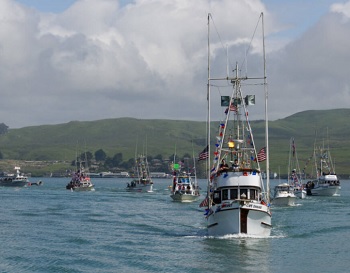
50th Bodega Bay Fish Fest to celebrate coastal fishing traditions despite salmon season closure
A two-day celebration of Bodega Bay’s fishing traditions will go on as usual this weekend, honoring the hardships and labor of the local commercial fleet, despite the setbacks of a curtailed crab season and a salmon fishery that has been shut down this year. Long scheduled to mark the start of the keystone king salmon season, the annual Bodega Bay Fisherman’s Festival, now in its 50th year, will fill the air with live music and the shouts and laughter of thousands of people gathered harbor-side for fun and games. For the commercial fishermen and women in whose honor the festival is held, it may be a more sober version than most. >click to read< 07:45
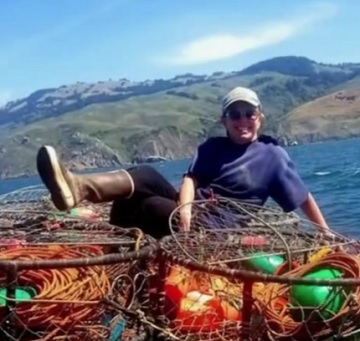
Bay Area restaurants, crabbers prepare as whales force Dungeness crab season to close early
In an effort to protect humpback whales, the California Department of Fish & Wildlife announced commercial crab season in the region will come to a close on Saturday. “Being on the Wharf and in this restaurant all my life, we take a lot of pride in being able to go down to the boats, bring it back, serving the freshest fish possible,” said Paul Capurro, owner of Capurro’s Restaurant. “I think crab is one of the big things that makes Fisherman’s Wharf, Fisherman’s Wharf.” Local crabbers will see less revenue without spring fishing, said Holly Fruehling. “I for one was very excited to be spring fishing this year,” Fruehling said. Video, >click to read< 08:02
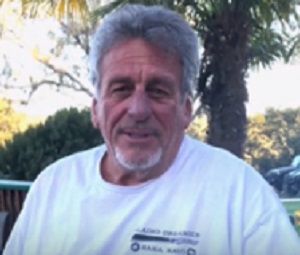
City of Morro Bay seeking answers on nearby offshore wind project
The offshore wind farm would be about 30 miles northwest of Morro Bay, but the project could have direct impacts on city infrastructure and the environment. “The city very much is concerned and wants to be better educated about the potential effects or impacts on the city and on the harbor,” said Morro Bay Interim City Manager Greg Carpenter. Not everyone is happy with the proposal. Some welcome an extra source of clean energy while others are worried about impacts to the marine environment and the local fishing industry. “We got a humpback highway right outside Morro Bay. We have tons of mammals out there and we don’t know what’s going to happen to them,” said Tom Hafer, President of the Morro Bay Commercial Fishermen’s Organization. Video, >click to read< 09:35
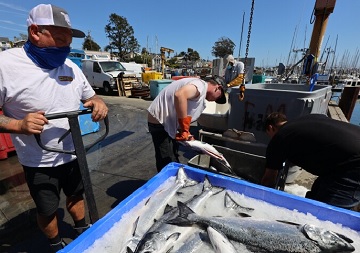
‘Disaster of a season for us’: Cancellation ripples through California salmon fishery
California’s salmon fishermen are seeking federal disaster aid after getting the word that the 2023 commercial and recreational salmon season has been canceled. It comes as projections show record-low salmon stocks, and regulators say the closure is needed to ensure maintenance of a healthy salmon population. Much of the fishing in Oregon has also been canceled. “It’s obviously a disaster of a season for us,” said Tim Obert of Ben Lomond, who has been fishing salmon commercially for close to two decades. “It takes our living away.” >click to read< 17:28
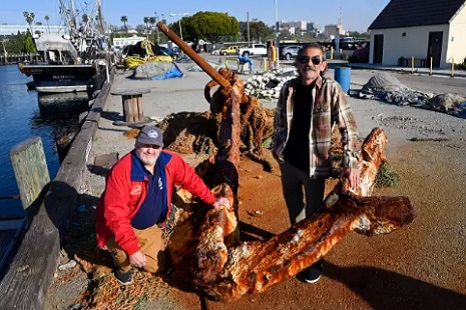
San Pedro fisherman pulls up a mammoth relic from the past
Talk about an epic haul. It was a beautiful fall day in mid-November when San Pedro fishing boat skipper Vince “Enzo” Lauro and his five-man crew on the 70-foot-long St. Joseph headed out for what was to be a routine day collecting squid. But what they wound up hauling onboard nearly rolled the vessel: An old, 8,000-pound anchor that had been sucked down long ago into the ocean floor several miles off the Long Beach breakwater opening. Lauro, 59, described the find succinctly: “Crazy.” 6 photos, >click to read< 14:58
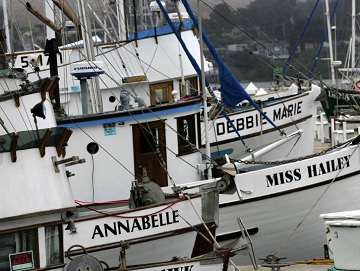
State, federal officials vow to take quick action on Federal Fishery Disaster Declaration for salmon fishing industry
State and federal officials are vowing to move quickly to secure disaster aid for Californians affected by the closure of this year’s commercial and recreational salmon season, which could have an economic impact of $1.4 billion, according to one industry group. The administration of Gov. Gavin Newsom requested a Federal Fishery Disaster Declaration from U.S. Commerce Secretary Gina Raimondo after a decision Thursday by the Pacific Fishery Management Council to recommend full closure of both commercial and recreational salmon seasons this year. It’s unclear what that might mean in terms of total dollars and eligible stakeholders. >click to read< 08:03
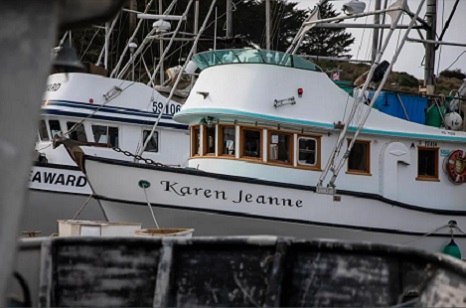
California could have avoided salmon season shutdown. Did we learn nothing last time? by Sarah Bates
I fish salmon commercially from Fisherman’s Wharf in San Francisco. You can see the Golden Gate Bridge from my boat, where Chinook have passed for millions of years on their journey from the ocean, through the bay and Delta, up the Sacramento River. There is communal anticipation before the first trip of the summer, checking anchor winches and hydraulic hoses, safety equipment, leaders, weather reports. Boats are freshly painted and deck tanks for holding fish are installed. Not this year – this year feels like a funeral. >click to read< by Sarah Bates 09:52
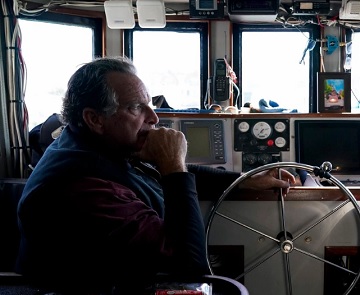
Pacific Fishery Management Council approves salmon fishing ban for much of West Coast
A federal regulatory group voted Thursday to officially close king salmon fishing season along much of the West Coast after near-record low numbers of the fish, also known as chinook, returned to California’s rivers last year. The Pacific Fishery Management Council approved the closure of the 2023 season for all commercial and most recreational chinook fishing along the coast from Cape Falcon in northern Oregon to the California-Mexico border. Limited recreational salmon fishing will be allowed off southern Oregon in the fall. Biologists say the chinook salmon population has declined dramatically after years of drought. Though the closure will affect tens of thousands of jobs, few are opposed to it. Many fishers say they want to take action now to guarantee healthy stocks in the future. >click to read< 09:03
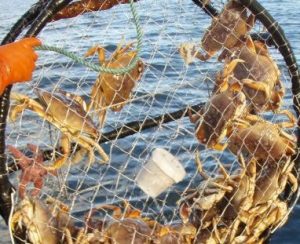
For Whales and Crabbers, Finding Balance Is Getting Harder
In Dick Ogg’s 25 years of commercial fishing, he’s had a few close encounters with whales—mostly while pulling Dungeness crab pots off the ocean floor. “I’ve had whales right next to me,” within about five meters, says Ogg. “They follow me, they watch, they’re curious. And then they go on about their business.” Ogg is fortunate his interactions have been so leisurely. For nearly a decade, California’s whales and crabbers have been locked in a persistent struggle. From 1985 to 2014, the National Oceanic and Atmospheric Administration (NOAA) reported an average of 10 whales were entangled in fishing gear each year along the west coast of the United States. >click to read< 07:53
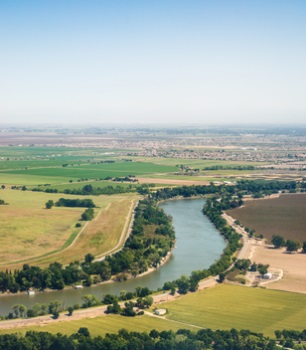
Salmon fishermen reflect on causes, future as closure looms
Earlier this year, Governor Gavin Newsom signed an executive order urging California’s water board to waive environmental laws and reserve water for future agricultural use, that would otherwise be released to help insure the survival of native fish and wildlife species. “The politics of water mismanagement readily and consistently traverses party lines,” Davis said. “So we’re trying to get equitable allocation of the resource to the different sectors, agricultural, residential, and environmental, which supports the salmon.” Tim Obert, a salmon fisherman based out of Santa Cruz, said the ramifications of the closure could be devastating. >click to read< 10:16
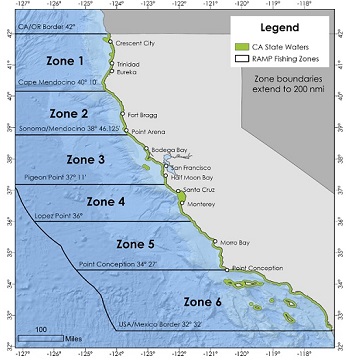
CDFW Announces Closure Of Commercial Dungeness Crab Fishery Off Central California To Protect Humpback Whales
California Department of Fish and Wildlife (CDFW) Director Charlton H. Bonham has assessed entanglement risk under the Risk Assessment Mitigation Program (RAMP) and announced a fishery closure for the commercial Dungeness crab fishery in fishing zones 3, 4, 5 and 6 (Sonoma/Mendocino county line to the U.S./Mexico border) effective at noon on April 15, 2023. The take and possession of Dungeness crab is therefore prohibited after noon on April 15, 2023, in fishing zones 3-6. This season closure is being implemented to minimize entanglement risk for humpback whales as they return to forage off the coast of California and in response to several entanglements that occurred during March and April of 2022. >click to read< 06:53
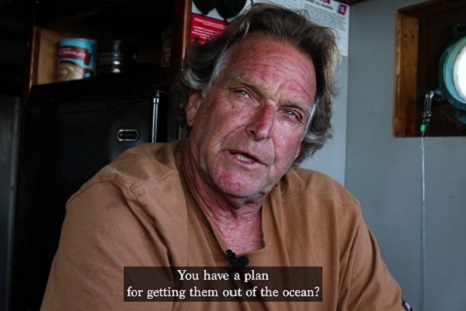
Morro Bay – Winds of Change
The offshore wind industry is expected to grow in coming years, sourcing a global market for renewable energy. The waters off Morro Bay have been sanctioned by The Bureau of Ocean Energy Management (BOEM) as a viable site for offshore wind development, considering the town’s existing electrical transmission capabilities. The introduction of an offshore wind farm would have devastating effects on Morro Bay due to the town’s historic reliance on the fishing industry. This project has the potential to displace fishermen and cause widespread economic harm to the community. Winds of Change explores the complexities of this case, while giving underrepresented fishermen a voice in the matter. Video, >click to watch< 10:01
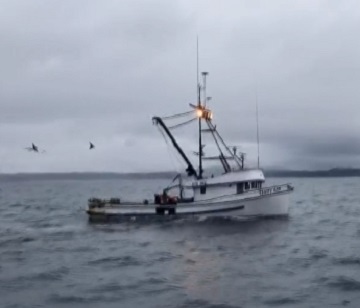
Imperiled Chinook salmon runs close ocean fishing off California, much of Oregon
The closure currently runs through May 15 and affects a length of the coast stretching from Oregon’s Cape Falcon, near Cannon Beach, south to the Mexican border. And it could be extended, officials said, as the imperiled species struggles amid a long-running drought. Further closures are likely, said Eric Schindler, head of the Oregon Department of Wildlife’s Ocean Salmon Program.“It doesn’t look good for this year or next year, and possibly the year after that, because of the drought conditions in California,” Schindler said. “We have to make sure that we’re not undermining our ability to produce salmon for the next go around.” Video, >click to read< 10:35







